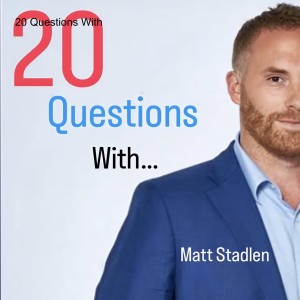20 Questions With
I’m Matt Stadlen and for 20 years I’ve been talking to and interviewing public figures from around the world. In this series I’ll be interviewing famous names from every walk of life and with a broad range of views, politics and perspectives. Every guest will get 20 questions, and the plan is for you to have a better sense of each of them by the end of their interview.
Episodes

Wednesday Jul 30, 2025
Wednesday Jul 30, 2025
Simon Calder is a household name in Britain, popping up on our TV screens and radio stations when a big travel story hits the headlines. Here he tells us the story of how he fell in love with traveling, names some of his favourite destinations in the UK and beyond, explains why travel has become easier since he started out as a journalist, and gives his verdict on the ethical questions facing travellers.

Tuesday Jul 22, 2025
Tuesday Jul 22, 2025
Sir Jeremy Hunt was the Chancellor of the Exchequer tasked with fixing the crisis created by the Mini Budget under Prime Minister Liz Truss. Before that he was Foreign Secretary, the longest serving Health Secretary in British history, and the Secretary of State in charge of the 2012 London Olympics. Here he reflects on his time as Chancellor and the decisions he made, the pressures of the job, his dispute with doctors when in charge of the NHS, and gives his views of Rachel Reeves' handling of the economy, the importance of welfare reform, the cost of pensions, his commitment to lower taxes, the need to control migration to the UK, Starmer's chances of reforming the ECHR, the chances of a Tory recovery, and explains his love of running. Hunt's book, Can We Be Great Again? Why a Dangerous World Needs Britain, is out now.

Tuesday Jul 15, 2025
Tuesday Jul 15, 2025
Dame Maureen Lipman reflects on her career on stage, in film and on our TV screens. From Shakespeare to Coronation Street, from her role as Beattie in the iconic BT ads to sitting on stage alone in Rose, Lipman's versatility as an actress has spanned decades in the limelight. A household name, she discusses laughter, marriage, motherhood, Jewishness, childhood and ambition. With vignettes and anecdotes from a life surrounded by acting royalty, this is a rare insight into one of Britain's leading actresses of her generation.

Friday Jun 27, 2025
Friday Jun 27, 2025
An MP for almost four decades before he stepped down at last year's General Election, Sir John Redwood gives his insights into the politics and policies of yesterday, today and tomorrow. Taking in Thatcher, Blair, Cameron and Starmer, Redwood sets out his vision for a more prosperous Britain.

Wednesday Jun 25, 2025
Wednesday Jun 25, 2025
One of the best known politicians of his generation, Sir Jacob Rees-Mogg divides opinion. Here he discusses the impact of his Catholicism on his political views, offers his vision for a more prosperous Britain, reflects on his public image, and reveals his passions outside of politics.

Monday Jun 23, 2025
Monday Jun 23, 2025
One of the most iconic voices in sport, indeed one of the most iconic voices in the history of radio, Henry Blofeld shares his reflections on a career behind the mic during which he bore witness to some of the greatest feats in cricketing history. Now 85 and retired from the BBC's Test Match Special commentary team, he recalls the day the legendary John Arlott described the game's first streaker at Lord's (complete with impressions of Arlott and Brian Johnston), remembers some of his favourite players and their top innings, gives his verdict on Ben Stokes and Bazball, and makes his predictions for England's series against India and this winter's Ashes in Australia. Congratulating the multi-racial South African side recently crowned Test champions, Blowers extols the unrivalled virtues of the longest form of the game, and calls for matches to remain five day affairs. With his idiosyncratic charm and good humour, the Old Etonian, whose surname was the inspiration behind one of Ian Fleming's most notorious Bond villains, and who once almost played cricket for England himself by mistake, shares stories and offers his analysis on the sport he loves.

Saturday Jun 21, 2025
Saturday Jun 21, 2025
Twenty five years since the launch of Trigger Happy TV, its star and creator, Dom Joly, reflects on a career that has taken in comedy, diplomacy in Prague, journalism, a trip to North Korea, and Twitter spats. Brought up partly in Lebanon during the civil war, Joly offers insights into how he became a household name on prime time TV, his experience of anxiety and depression, why he hates extremism, and how long it's taken him to feel comfortable on stage.

Tuesday Jun 17, 2025
Tuesday Jun 17, 2025
Right-leaning comedian Geoff Norcott on stand-up, being serious, talking politics, fatherhood, career trajectory, Labour's tax rises, challenging audiences, touring the country, podcasting, ageing, weight-lifting and keeping busy.

Monday Jun 16, 2025
Monday Jun 16, 2025
Senior rugby writer at The Telegraph, Charlie Morgan, shares his insights and passion for the game. From 20 year-old superstar Henry Pollock to the recently crowned Premiership champion Max Ojomoh; from muscle mass to instinct and flair under pressure; from England's prospects to the coming Lions series; from big name interviews to micro analysis, Charlie takes us behind the scenes of rugby journalism.

Sunday Jun 08, 2025
Sunday Jun 08, 2025
Author, journalist and Twitter personality Otto English on social media under Musk, the Labour government, Farage, why Brexit made him so angry, why he's known as Otto English more than his real name, Andrew Scott, the myth about Dunkirk, heroes and villains from history, fake news, and his amazing children.



